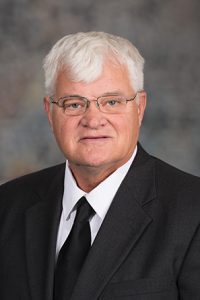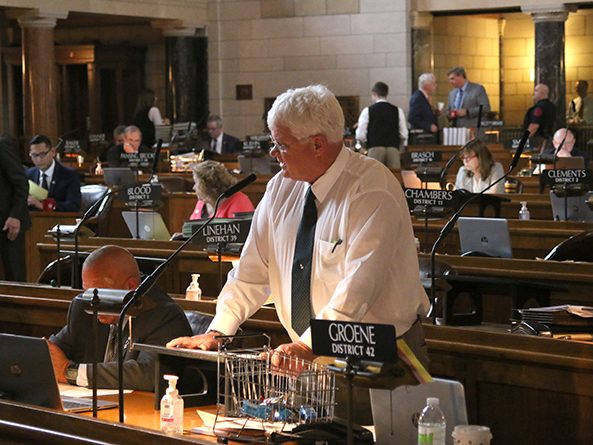Property tax fund considered for additional school aid
The Legislature debated a bill April 18 that would direct more state aid to schools that rely on property taxes for more than 55 percent of their general fund revenue.

As introduced by Sen. Mike Groene of North Platte, LB640 would decrease the maximum levy for school districts and direct money in a property tax credit fund — which is funded by state income and sales taxes — to increase state aid to districts that lose money as a result.
Groene said the bill is intended to more fairly distribute funding under the state’s school aid formula. As valuations on agricultural land have increased over the last decade, he said, rural schools have received less and less state aid because they can rely on property taxes to meet their needs. This has placed a disproportionate burden on rural property taxpayers, Groene said.
“[LB640] puts equity back into funding of our schools for every single property tax payer in the state,” he said.
A pending Revenue Committee amendment would replace the bill, reducing the maximum levy for school districts from $1.05 per $100 of taxable valuation of property in a district to 98.7 cents per $100 beginning in fiscal year 2018-19.
For tax year 2017, $224 million would be transferred from the property tax credit fund to the school aid fund. A school district could qualify for property tax relief aid if its property tax receipts exceed 55 percent of its total revenue. A school district that receives property tax relief aid would decrease the amount of property taxes it collects by the same amount.
For years in which a temporary reduction in aid is in place, a district could levy up to an additional 3 cents above the maximum levy after a public hearing and approval by two-thirds of the district’s board.
Henderson Sen. Curt Friesen supported the bill and the committee amendment. Friesen said that no schools in his district receive equalization aid, which is state aid intended to cover the needs of school districts that cannot be met by other resources, such as property taxes. He said LB640 would be a small way to address the shift in state aid from rural districts to urban districts.
“If [LB640] would go into effect, it would bring more state aid to all those non-equalized districts that currently receive none,” he said.
Sen. Roy Baker of Lincoln opposed the bill, saying that it would channel more state aid to some rural districts that have more resources and away from poorer districts. In his district, he said, Tri County Public Schools outside DeWitt would receive property tax relief aid under LB640 even though its tax levy is far less than that of Beatrice Public Schools.
“This is like a reverse Robin-Hood bill,” Baker said.
Lincoln Sen. Kate Bolz also opposed the bill. By directing all of the money in the property tax credit fund to school aid, Bolz said, LB640 effectively would increase property taxes on homeowners in her district.
“I’m struggling to understand how I could talk to my neighbors about why this legislation works for them and how I can keep my commitment to that property tax credit program,” she said.
Sen. Dan Hughes of Venango, who supported the bill, acknowledged that property taxes in some urban districts could increase if LB640 is implemented, but he said property taxes on agricultural land in many cases have doubled in the last five years.
“I don’t think that asking for a little bit of that shift back from the urban homeowner is out of line,” Hughes said.
The Legislature adopted a technical amendment but moved on to other bills on the agenda without voting on the committee amendment or LB640.


